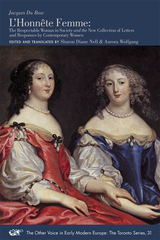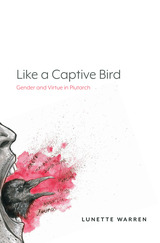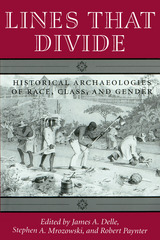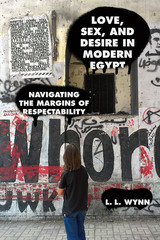4 start with L start with L

—Reverend John J. Conley, SJ
Knott Professor of Philosophy, Loyola University Maryland

The full extent of Plutarch’s moral educational program remains largely understudied, at least in those aspects pertaining to women and the gendered other. As a result, scholarship on his views on women have differed significantly in their conclusions, with some scholars suggesting that he is overwhelmingly positive towards women and marriage and perhaps even a “precursor to feminism,” and others arguing that he was rather negative on the issue. Like a Captive Bird: Gender and Virtue in Plutarch is an examination of these educational methods employed in Plutarch’s work to regulate the expression of gender identity in women and men. In six chapters, author Lunette Warren analyzes Plutarch’s ideas about women and gender in Moralia and Lives. The book examines the divergences between real and ideal, the aims and methods of moral philosophy and psychagogic practice as they relate to identity formation, and Plutarch’s theoretical philosophy and metaphysics.
Warren argues that gender is a flexible mode of being that expresses a relation between body and soul, and that gender and virtue are inextricably entwined. Plutarch’s expression of gender is also an expression of a moral condition that signifies relationships of power, Warren claims, especially power relationships between the husband and wife. Uncovered in these texts is evidence of a redistribution of power, which allows some women to dominate other women and, in rare cases, men too. Like a Captive Bird offers a unique and fresh interpretation of Plutarch’s metaphysics which centers gender as one of the organizational principles of nature. It is aimed at scholars of Plutarch, ancient philosophy, and ancient gender studies, especially those who are interested in feminist studies of antiquity.

The division of human society by race, class, and gender has been addressed by scholars in many of the social sciences. Now historical archaeologists are demonstrating how material culture can be used to examine the processes that have erected boundaries between people.
Drawing on case studies from around the world, the essays in this volume highlight diverse moments in the rise of capitalist civilization both in Western Europe and its colonies. In the first section, the contributors address the dynamics of the racial system that emerged from European colonialism. They show how archaeological remains shed light on the institution of slavery in the American Southeast, on the treatment of Native Americans by Mormon settlers, and on the color line in colonial southern Africa. The next group of articles considers how gender was negotiated in nineteenth-century New York City, in colonial Ecuador, and on Jamaican coffee plantations. A final section focuses on the issue of class division by examining the built environment of eighteenth-century Catalonia and material remains and housing from early industrial Massachusetts.
These essays constitute an archaeology of capitalism and clearly demonstrate the importance of history in shaping cultural consciousness. Arguing that material culture is itself an active agent in the negotiation of social difference, they reveal the ways in which historical archaeologists can contribute to both the definition and dismantling of the lines that divide.
The Editors: James A. Delle is an assistant professor of anthropology at Franklin and Marshall College and the author of An Archaeology of Social Space: Analyzing Coffee Plantations in Jamaica's Blue Mountains.
Stephen A. Mrozowski is an associate professor of anthropology at the University of Massachusetts–Boston, director of the Andrew Fiske Memorial Center for Archaeological Research, and co-author of Living on the Boott: Historical Archaeology of the Boott Cotton Mills, Lowell, Massachusetts.
Robert Paynter is a professor of anthropology at the University of Massachusetts–Amherst, author of Models of Spatial Inequality, and co-editor of The Archaeology of Inequality.
The Contributors: Marjorie R. Abel, Mark Bograd, James A. Delle, Terrence W. Epperson, William B. Fawcett, Ross W. Jamieson, David L. Larsen, Walter Robert Lewelling, Patricia Hart Mangan, Stephen A. Mrozowski, Michael S. Nassaney, Thomas C. Patterson, Robert Paynter, Warren Perry, Paul A. Shackel, Theresa A. Singleton, Diana diZerega Wall.

Cairo is a city obsessed with honor and respectability—and love affairs. Sara, a working-class woman, has an affair with a married man and becomes pregnant, only to be abandoned by him; Ayah and Zeid, a respectably engaged couple, argue over whether Ayah’s friend is a prostitute or a virgin; Malak, a European belly dancer who sometimes gets paid for sex, wants to be loved by a man who won’t treat her like a whore just because she’s a dancer; and Alia, a Christian banker who left her abusive husband, is the mistress of a wealthy Muslim man, Haroun, who encourages business by hosting risqué parties for other men and their mistresses.
Set in transnational Cairo over two decades, Love, Sex, and Desire in Modern Egypt is an ethnography that explores female respectability, male honor, and Western theories and fantasies about Arab society. L. L. Wynn uses stories of love affairs to interrogate three areas of classic anthropological theory: mimesis, kinship, and gift. She develops a broad picture of how individuals love and desire within a cultural and political system that structures the possibilities of, and penalties for, going against sexual and gender norms. Wynn demonstrates that love is at once a moral horizon, an attribute that “naturally” inheres in particular social relations, a social phenomenon strengthened through cultural concepts of gift and kinship, and an emotion deeply felt and desired by individuals.
READERS
Browse our collection.
PUBLISHERS
See BiblioVault's publisher services.
STUDENT SERVICES
Files for college accessibility offices.
UChicago Accessibility Resources
home | accessibility | search | about | contact us
BiblioVault ® 2001 - 2024
The University of Chicago Press









